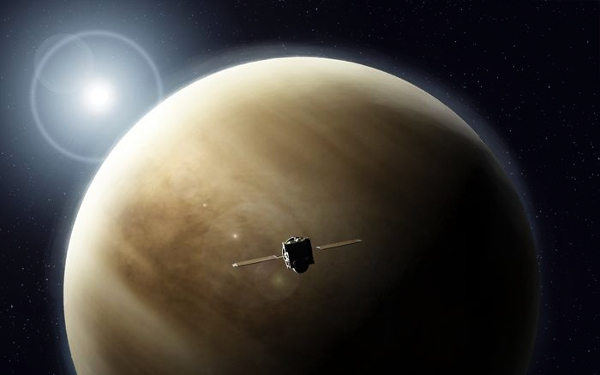Scientists and engineers at the Indian Space Research Organisation (ISRO) have sent plans for a Venus orbiter to the Indian national government and are hoping they’ll get approval to go ahead with the mission. The spacecraft could launch in just a few years and would carry more than a dozen instruments.
“The major objective is to map the Venusian surface and subsurface,” Nigar Shaji, an ISRO scientist, told a group of Venus experts during a meeting held this week in Colorado.
According to Shaji, the Venus orbiter that ISRO is designing would be able to create such a dataset for Venus in about a year. In addition to mapping the surface itself, looking a bit deeper into the planet should help scientists identify volcanic hotspots scattered across Venus.
Instruments onboard the spacecraft would also study the planet’s atmosphere and ionosphere, as well as how Venus interacts with the surrounding environment, Shaji said. ISRO has identified 16 instruments from Indian scientists that it would like to fly. Those include instruments focused on monitoring clouds, identifying lightning strikes, studying the eerie airglow of the planet and measuring the highly charged plasma particles passing by Venus on their way out from the sun.
Another few instruments came from international partnerships. Three of those were proposed by U.S. scientists, but Shaji said ISRO understands that the funding for those instruments is not viable, so the agency is currently assuming the trio won’t fly.
If the mission is approved, the spacecraft could launch in June 2023 on one of ISRO’s Geosynchronous Satellite Launch Vehicles, the same type of vehicle that launched India’s Chandrayaan-2 mission to the moon this summer.
In India’s history of launches, that spacecraft followed its predecessor, which launched in 2009, and the Mars Orbiter Mission, which launched in 2013. ISRO has also discussed returning to the Red Planet, but preliminary timelines suggest that such a mission would likely launch after the Venus orbiter.
Source:SPACE
Image Courtesy: Nature
You may also like
-
New Heat-Based Approach To Cancer Treatment Can Reduce Chemotherapy Doses
-
Scientists Take A Major Step Towards Unification Of Classical & Quantum Gravity
-
India Graphene Engineering and Innovation Centre (IGEIC) Under the Vision of Viksit Bharat@2047 Launched
-
New High-Performance Gas Sensor can Monitor Low Level Nitrogen Oxides Pollution
-
Antidepressant Drug can be Repurposed for Treating Breast Cancer
